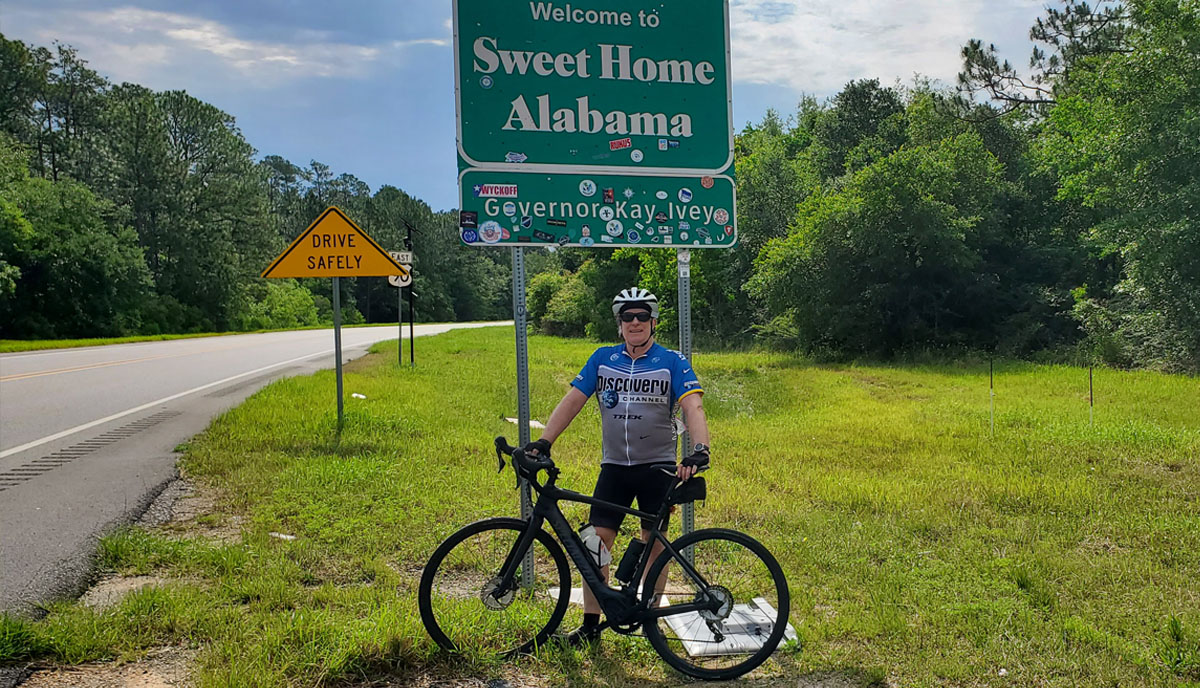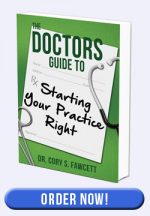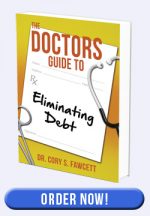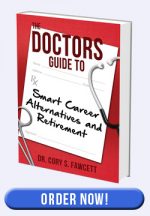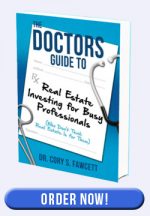My son, brother-in-law, wife and I recently completed a bicycle ride across America from San Diego, CA to St. Augustine, FL. The details of our journey are chronicled in my last eight blog articles. During this 49-day adventure, many life/financial lessons came to light. We can all benefit from the pearls I learned.
No, you can’t eat anything you want just because you are burning tons of calories exercising.
It’s amazing how many times I have heard someone say, “You are burning so many calories when riding that you can eat anything you want.”
I found this statement to be false. The first time I heard it was while I was riding Cycle Oregon, a one week, 100 mile a day ride through Oregon. I took that advice to heart. I ate all I wanted at every rest stop and every meal. After all, the food was included in the price of the ride, and I wanted to get my money’s worth. I gained several pounds that week!
No matter how much you exercise, you still need to keep your calorie intake equal to or less than your output. If you eat more calories than you burn, your body will store fat and you will gain weight even though you are burning a lot of calories.
This same concept applies to money. Just because you have a job that pays a lot of money, doesn’t mean you can buy anything you want. No matter how much money you make, you must spend equal to or less than that amount, or you will start falling into debt. Keep it up, and one day you will be struggling to make your debt payments and wondering what happened.
I see this most often when someone has a sudden change in income. The graduating resident who just transitioned to an attending salary, the graduating college athlete who signs a great endorsement deal, or the actor or musician who just had a big hit. In all these examples the recipient has a sudden increase in income and believes they can now spend lots of money.
Often these people aren’t spending the money they are making, they are borrowing money anticipating that they will be able to make the new payments with their new high income. A great example of this is the graduating resident who borrows money to buy a $100,000 car the first month they start their new job. Another example is the Hollywood star who just had a hit movie and buys a $20M mansion. These people are not just outspending their income, they are spending it before they even have it, anticipating their high income will continue indefinitely.
No matter how high our income, we still must keep our spending at bay.
Never underestimate the value of what your spouse contributes to your life.
Our ride across America would have been very different without the help of my wife. She did not like the idea of driving the car all day alone for two months. This was not even her adventure. Yet, she was right there making our dream come true. We could not have done this without her help. Thanks Carolyn!
We often discount the effort and importance of the non-spotlighted spouse. In our case, only the three riders were in the spotlight. But my wife’s role was equally valuable.
How often do we see the non-working spouse not given value? I read many posts with statements like these:
“How do I set up a prenup so my new spouse can’t take all my money? My income is higher than my fiancé’s income, and I don’t want her/him to get all my money.”
“Anybody know a shark lawyer who can make sure my spouse doesn’t get anything in our divorce? I’m the one who earned it all. She doesn’t deserve anything.”
“How do we split the living expenses when we don’t earn the same income? I don’t want to pay more than my share.”
A non-working spouse is a tremendous financial asset. If you earn a high income, your spouse will be instrumental in whether you keep any of it. One of you can play good offense (the earner) and the other can play good defense (the wise spender).
How great will a quarterback be if he has poor linemen who don’t give him enough time to throw the ball? Yet the quarterback gets all the glory. You rarely see a post-game interview with a lineman.
We carry the basketball player off the court on our shoulders who made the winning shot at the buzzer, as if all the prior points scored by the other players didn’t matter. If any of the prior baskets had been missed, the player on those shoulders would not have “won the game.”
Take time today to let the other members of your family know how important they are to the success of your family.
Work on today’s tasks.
When we started riding our bicycles, a 3,000 mile ride all the way to the other side of the United States seemed impossible. Many people told us they could never achieve such a big undertaking. Many people along the way asked where we just rode from. One time in Texas I said San Deigo, and their eyes got really big. They asked if I was messing with them.
If we concentrate on the huge size of a task, we often scare ourselves out of doing it. We won’t even start sometimes if the task seems too daunting. But if we break the task into manageable chunks, we can achieve success. On my bicycle ride, I didn’t have to ride 3,000 miles all at once. All I needed to do today was a 65-mile ride, which I have done many times before. I know I can do that.
By breaking big tasks into little tasks, they become reachable. I might never have ridden 3,000 miles before, but I don’t have to do that super hard task. Today’s job is to ride 65 miles. Then tomorrow I will ride another 65 miles. Sooner than we think, we are on the other side of the country.
I once worked with a new author who was being held back by the fear of writing a 30,000-word book. After reading a good 500-word chapter he had written, I asked how long it took to write the first draft of those 500 words. He said less than an hour.
I gave him a challenge. Beginning tomorrow, write 500 words each day, a one-hour task he knows he can do. Repeat that every day for two months and he will have completed the first draft of his 30,000-word book. Writing a book to him was scary since he had never done it before. But he could write 500 words, that was doable.
Don’t worry about tackling a big task. Break it down into little tasks and concentrate on one small task each day. I finished my five-year surgical residency at a pace of one day at a time.
We need less stuff than we think.
I am amazed at the number of suitcases people take to the airport for a one-week vacation. Many can’t get through the airport without a cart.
I was gone for two months on this trip and only took one suitcase. We did laundry weekly. It turned out even that was more than I needed as there were many items in my suitcase I didn’t use on the trip. When Carolyn and I walked 450 miles on the Camino De Santiago, I learned we don’t need as much stuff as we think and have tried to pack less when traveling.
But this applies at home as well. Does anybody need 50 pairs of shoes? Certainly not. But somehow, we make ourselves believe we can’t do without them. Do we need to rent a storage unit for all the things that don’t fit into our house? No. If you haven’t used those things for several months, you don’t need them. Stop paying to store them. The storage fees usually exceed the value of the stuff we put in the storage unit.
Life is a lot better when we have culled out all the unneeded things we surround ourselves with. The more we have, the longer it takes to find an object we need. It’s time to simplify.
We can do a lot more than we think we can.
How many times have you told yourself you can’t do something? When Keith asked me to go on a bicycle ride across the country, I already had a lot of things on my schedule. I could have said “I can’t right now because I have too much stuff to do.”
Instead, I looked at my calendar and started rescheduling or canceling all my commitments. All the people I contacted said go for this once in a lifetime adventure, we will fill in for you. Within 72 hours, I had a completely cleared schedule and I said yes to the adventure. This is not the first time I’ve done this to make way for something I wanted to do, even back when I was working full time. People I was afraid to contact and ask to cancel/postpone/reschedule seemed more excited for my adventure than I was.
If something comes up you really want to do, don’t assume you can’t do it just because your schedule is already full, figure out how you can say yes. I have a friend who gives this response to all my adventures, “I wish I could do that, but I have X on my plate.” Until he learns that he is not indispensable and can let someone else fill in for him, he will never find time to take an adventure because there is always something on the schedule.
Have you ever said something like, “I wish I took piano lessons when I was young. It’s too late now.” It is never too late to do things you want to do. Stop putting it off and go for it. We are capable of so much more than we think.
Obstacles don’t stop us; they just slow us down.
Obstacles are a part of life. No matter what you want to do, there are always things you will need to overcome. Flat tires don’t stop us from crossing the country on a bicycle, they slow us down as we must first fix the flat tires. Broken shoes are not an excuse to stop, they are a reason to visit the shoe store. Being out of shape is not a reason to say no, it is a reason to get in shape.
How many times in life have we let obstacles stop us from doing something? I could have said I can’t go on this ride because I have a speaking engagement booked during that time. Instead, I contacted the person in charge of scheduling the speaker and discussed the situation. As it turned out, she could easily find another speaker to cover for me and was happy to help me do this once in a lifetime adventure. I was not nearly as crucial to their event as I thought I was.
When I wanted to take the lead part in a musical, I could have said I can’t do it because I need to take call during the rehearsals and performances. Instead of letting that stop me, I made a deal with one of my partners to cover my call for two months, while I was in the musical. Once the musical was over, I reciprocated by taking his call for two months.
Don’t let obstacles interfere with doing something special you want to do. Find a way to get around the obstacles. There is always a way.
Vacations are important.
The purpose of vacations is to create a change in what we are doing and to give us a chance to rest to help keep us from burning out. On this bike ride, I certainly was not resting, but I had a distinct change in my activities.
I stopped writing my usual weekly blog, and I took a break from writing my next book. Even though I don’t spend much time working on my Financial Success MD business, (I’m trying to be retired) it still takes a toll on me. Taking the two months off my usual writing schedule was a great benefit for me. The only writing I did was a very short recap of each day’s ride. It was like making a diary entry.
Now I feel I am ready to finish writing my seventh book. The time off has given me a renewed passion for writing.
As physicians, we tend to be workaholics. We are not inclined to take our vacations. And when we do take them, we cram in so much “fun” that we often come home needing a vacation from our vacation, being more tired than when we left.
Use your vacation time to relax, rest and recharge and come home refreshed. Having recovery time is important and is a big factor in preventing burnout.
While we were riding, each week we took one day off. That single day of not exercising, made the next riding day so much easier and more comfortable. We would have ridden ourselves into the ground and been forced to stop without those weekly breaks.
At the end of the ride, we spent two weeks leisurely driving home and not exercising. I gave my body a break and a chance to heal. Before I got back home, I felt ready to exercise again.
Don’t blow the time off weekends provide. You need to recover and refresh to be at your best for the next week. Don’t use weekends off to catch up at the office.
We all need breaks during the day, breaks during the week, breaks during the month and big breaks (vacations) during the year.
How was your last vacation? Did you come home refreshed and ready to work? Did you rush home, getting back late Sunday night, only to get up early Monday morning for work? Were you tired the first day back at work?
If any of these things are true for you, then make changes in how you approach your vacation so you come home refreshed.
Incorporate some of these lessons I learned during my ride across America into your life and you will find you can do more and stress less. What adventure is waiting for you? Next time you find yourself saying no to something great, rethink the possibility and go for it. In the end, it will be the things we didn’t do that we will regret.

